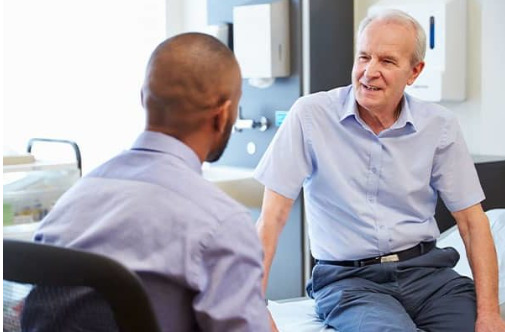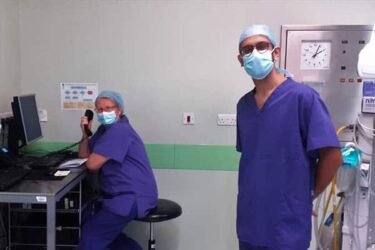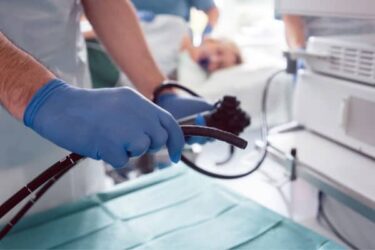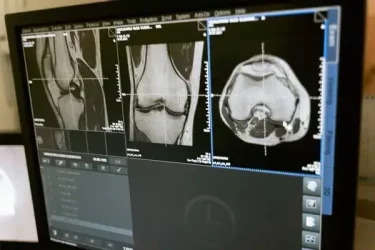Estimated reading time: 5 minutes
Are you experiencing unexplained symptoms and wondering if an endoscopy could uncover the problem? Discover some of the reasons to have an endoscopy to see if it’s the right option for you.

Private endoscopy at a glance
- Waiting time: 4-6 weeks
- Cost: £1,399-£1,849
- Ways to pay: self-pay, insured, finance options
What does an endoscopy show?
An endoscopy is when a slim, flexible tube with a camera and a light is inserted into your body through your mouth, nose or anus to help identify and diagnose the cause of a variety of symptoms.
There are different types of endoscopy. A gastroscopy (inserted via your mouth) can reveal issues affecting the oesophagus, stomach, and small intestine. A flexible sigmoidoscopy or colonoscopy inserted via the anus detects issues in the lower bowel (also known as the colon and rectum).
Learn more about self-pay endoscopy procedures.
When is endoscopy required? Signs to watch
When is endoscopy needed? Here are some signs to look out for and to discuss with your GP:
Stomach pain
If you are experiencing pain in your abdomen which is unusual or doesn’t settle over time, this could be symptomatic of an illness or condition. You should see your GP who may refer you for an endoscopy procedure to diagnose the cause of the problem.
Blood in your stool
This may be the sign of several lower bowel conditions. These could include haemorrhoids (piles), inflammation, polyps, or bowel cancer. If bowel cancer is diagnosed early, it can be treated. If you notice any blood in your stool or when you wipe yourself after going to the toilet, you should see your GP. He or she may suggest a flexible sigmoidoscopy or colonoscopy depending on the type of bleeding.
Difficulty swallowing your food
Also called dysphagia. This can be caused by a number of conditions ranging from inflammation caused by acid reflux, a problem with coordination of muscle function of the oesophagus, or more rarely, cancer of the oesophagus. If symptoms persist you should see your GP quickly and they may decide an endoscopy is required.
Acid reflux/heartburn
We have all suffered heartburn at some point. While antacids can help, if you are experiencing heartburn or acid reflux regularly or over a long period of time, it may be worsened by an underlying condition such as a hiatus hernia. This can be easy to manage if diagnosed. Long term acid reflux can uncommonly lead to Barrett’s oesophagus, where cells lining the oesophagus can change type. This may slightly increase the risk of cancer of the oesophagus, particularly if you have a family history of cancer of the oesophagus. If your experience of acid reflux or heartburn is long term, it should be discussed with your GP who may refer you for an endoscopy to investigate whether you have Barrett’s oesophagus.
Looser and more frequent bowel movements (diarrhoea)
Sometimes, these symptoms can be caused by a change in diet or lifestyle and may settle. However, if you experience them for more than three weeks, your GP may recommend a stool test for blood (a quantitative FIT test) and suggest a colonoscopy. The most common cause is Irritable Bowel Syndrome or diverticulosis. More rarely, significant polyps and bowel cancer may be found. Speak to your GP who may think it is appropriate for you to have an endoscopic investigation.
Nausea and vomiting
An endoscopy can be used to help determine the cause of issues such as nausea and vomiting. Gastroscopy is recommended as part of investigating these symptoms.
Unexplained weight loss
Unexplained weight loss can be caused by a range of different issues. Depending on any associated symptoms, gastroscopy or colonoscopy can be used to investigate further.
A family history of colon cancer or polyps
If three close relatives across two different generations have had bowel cancer, you have a higher than average familial risk of developing bowel cancer yourself. If this is the case, you should have a colonoscopy to screen for bowel cancer every five years from the age of 40 until 75.
Whatever your symptoms, always speak to your GP if you’re worried.
Why do I need an endoscopy?
An endoscopy can be used to investigate, diagnose, and treat a number of different problems. From diagnostic tests to taking tissue samples and removing polyps from the colon or lower bowel, endoscopy is a crucial procedure in the world of healthcare.
Why would a doctor order an endoscopy?
A doctor would recommend an endoscopy to help find the cause of a number of different issues. These include:
- chronic heartburn or acid reflux
- change in bowel habits (particularly if looser and/or more frequent
- blood in your stool
- if they suspect colorectal cancer
- if they suspect you may have cancer of the digestive tract.
Endoscopy can also be used to take samples of suspicious growths, remove polyps, and take tissue samples.
When should you have an endoscopy?
An endoscopy may be recommended by your doctor if you’re experiencing digestive issues, difficulty swallowing, or vomiting. Ongoing abdominal pain may also be a sign of an underlying condition that could be investigated by endoscopy.
What age should you have an endoscopy?
Endoscopy can be performed on patients of all ages. However, there are circumstances where endoscopy made be more (or less) appropriate. If a patient is over the age of 55 and experiencing certain symptoms, an endoscopy may be recommended. For younger patients, other tests (such as stool tests) may be used before endoscopy is recommended.
Who should not have an endoscopy?
Endoscopy is very safe for the majority of patients and our pre-assessment process aims to make sure that we can process safely. We would identify those who would not benefit from endoscopy in our units/ hospitals due to their medical conditions or medication prior to them attending. If additional advice is required around changing dosing of blood thinners (anticoagulants) to make the procedure safer, then we will advise of this in pre-assessment.
We are unable to carry out investigations on pregnant people, those with severe heart, lung and liver conditions and those with implantable cardiac defibrillators (although pacemakers are fine).
Is there an alternative to an endoscopy?
The alternatives to endoscopy include:
- non-invasive stool tests via your GP for Helicobacter (which may make indigestion worse) or a quantitative FIT test to look for blood in your stool
- imaging tests such as CT scans (for the colon) or barium examinations (to look at the oesophagus, stomach and small intestine). These are not available at PPG and do not allow biopsies or polyp removal. Due to this, an endoscopy may become necessary depending on findings.





